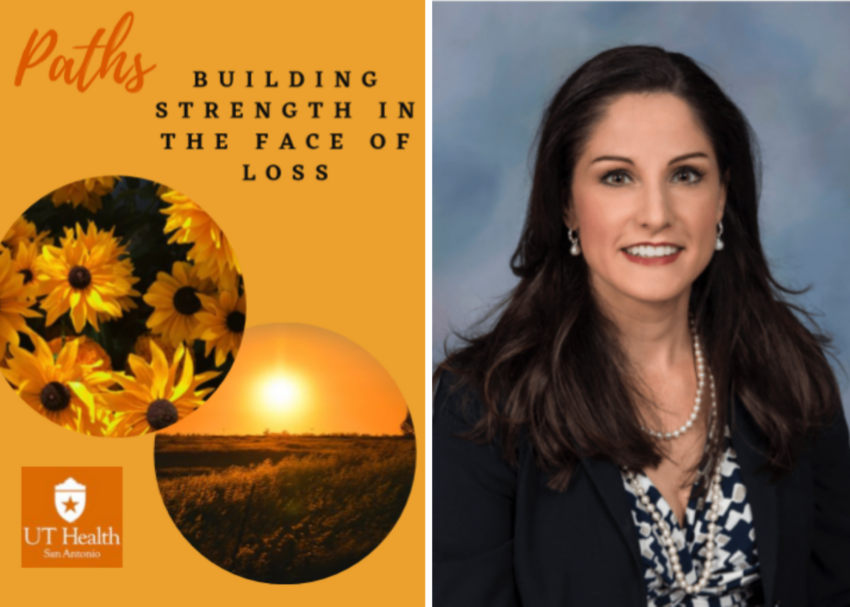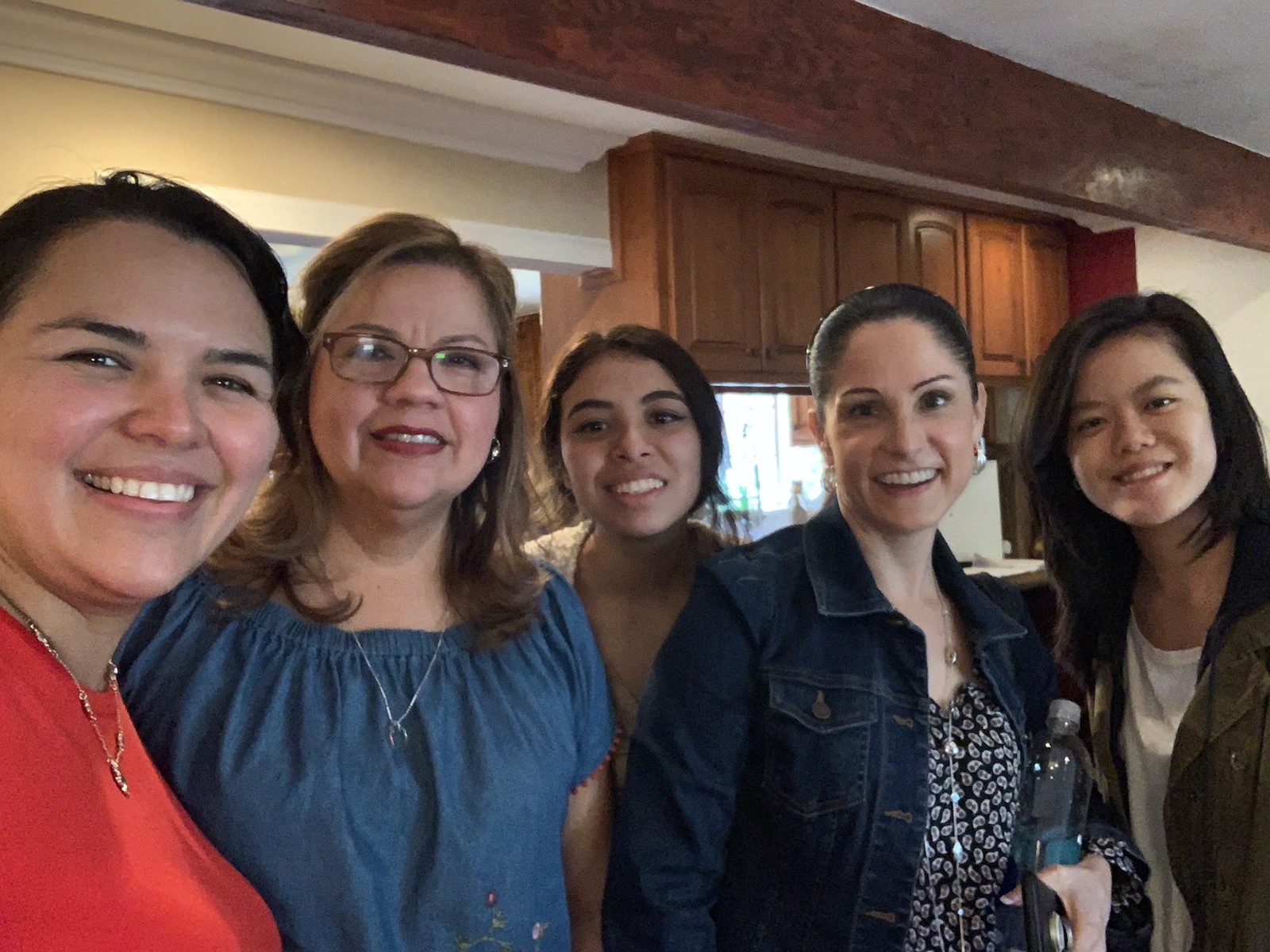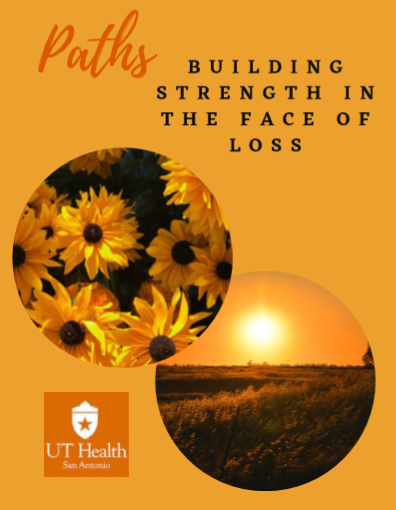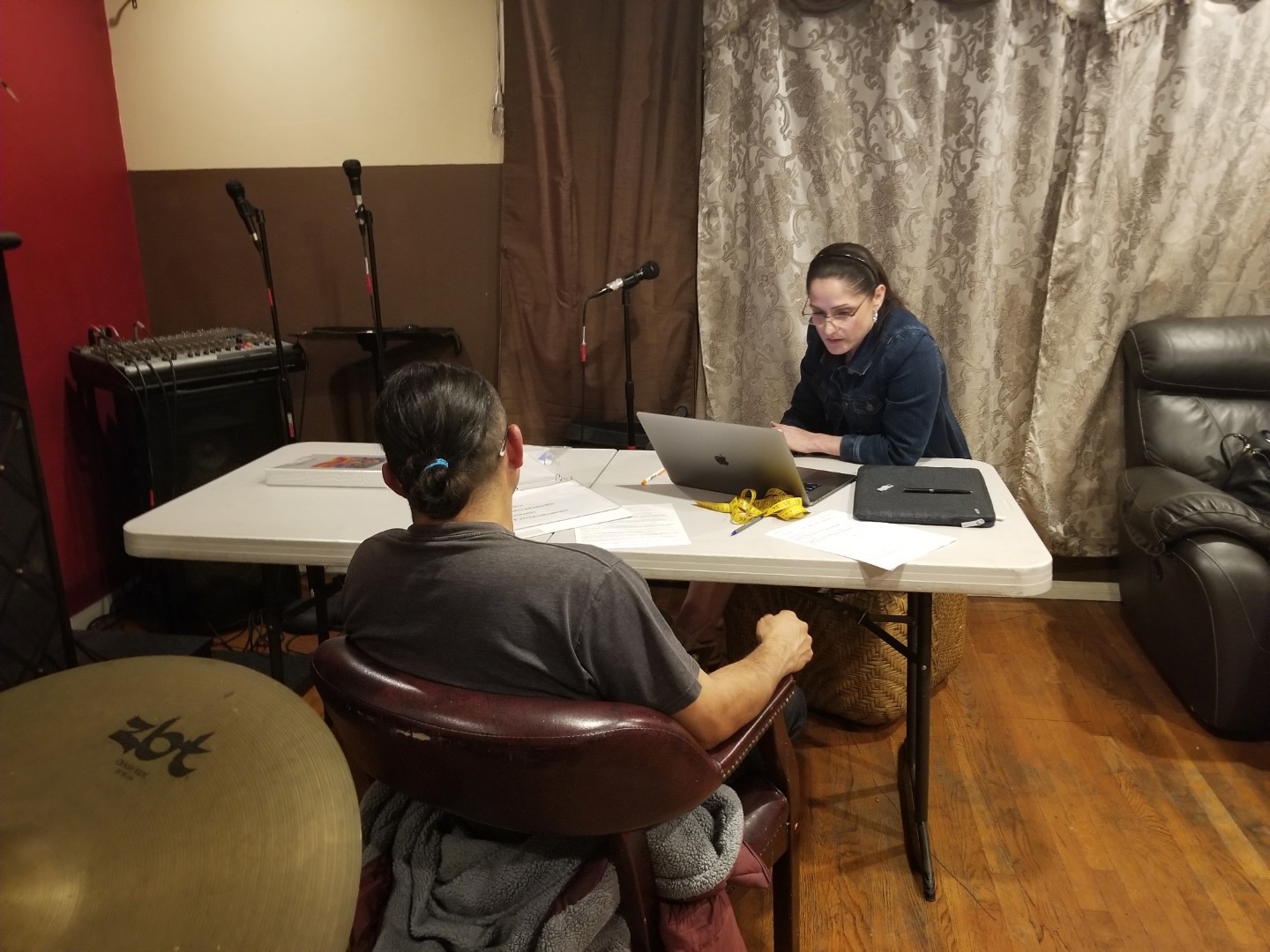
Share On Social!
Luz Garcini wants to help Latinos heal from the loss of a loved one.
“One of the biggest needs that we see in the community right now is that there has been a lot of loss and grief, particularly associated to the loss of loved ones over the current [COVID-19] pandemic, that has not been addressed,” Garcini said.
Garcini is a clinical psychologist and epidemiologist. She works as an assistant professor at the Center for Research to Advance Community Health (ReACH) at UT Health San Antonio.
To further the study of loss and grief among Latino immigrants, Garcini and her team at ReACH created a monthly webinar series, “Paths: Building Strength in the Face of Loss,” to help Latinos understand grief and build coping skills and strength.
She hopes the series will help Latinos build strength and eliminate the stigma around mental health.
“It’s so important to normalize the experience so that people don’t feel alienated,” Garcini said.
Garcini’s Background & Creating the Webinar Series
Over the last 15 years, Garcini has worked with underserved Latino communities, particularly hard-to-reach immigrant communities.
She feels drawn to serve this population.
“I’m a Latino immigrant myself, so it’s in my blood,” Garcini said. “Not only that, but it’s very rewarding to work with the communities in which we’re embedded, in which we live.”
While much of her work is clinical, Garcini also emphasizes policy-level changes.
“All of my work has a policy angle in some sort of way. I work a lot with the media, writing policy statements, but also in the development of resources, and follow more of an approach of building strength,” Garcini said.
She wants to build strength among Latinos so that those who don’t have access to traditional mental health services can meet their needs on their own.
“It’s a strength-based approach that we take in the community. We develop tools to strengthen them from within. A lot of these communities don’t necessarily have access to traditional sources of service delivery. So if we empower them, teaching how they can use resources to help themselves, we have a better chance of opening different ways of access for them,” Garcini said.
Garcini is always focused on helping her community meet their needs.

One of the biggest needs this year has been coming to terms with the enormous losses that the Latino community has experienced throughout the COVID-19 pandemic.
Because of systemic disparities, Latinos have faced a disproportionate burden of COVID-19. Cases, hospitalizations, and deaths have consistently been high among Latinos.
“There are a lot of people now that are experiencing long term effects of complicated grief, who have not had the ability to grieve and seek treatment for the loss of their loved ones,” Garcini said.
Garcini and her team created the webinars for two reasons.
The first is to give back to the community. The second is to recruit participants for Project Heart (Proyecto Corazon), a study funded by the National Heart, Lung, and Blood Institute (NHLBI) on the physical effects of grief among Latino immigrants.
“At the end of the webinars, we invite them to participate in a yearlong study that we’re having. There are inclusion criteria, so it’s only for people who are of Latino background or are non-Latino White, who have recently lost a spouse within the past five months. During the study, we undertake four visits with the participants, we do surveys and interviews at baseline, six months and 12 months, and then we collect a blood sample to really get how stress gets under the skin in the process of bereavement,” Garcini said.
Garcini wanted to take the opportunity to provide a bereavement service to the Latino community while she and her team had the funding available from the NHLBI study.
Together with the support of the Mays Cancer Center at UT Health San Antonio, the University Health System, and Alamo Palliative Care, Garcini and her team at ReACH were able to launch the webinar series, called “Paths: Building Strength in the Face of Loss.”
About Garcini’s ‘Paths: Building Strength in the Face of Loss’ Webinar Series
“Paths: Building Strength in the Face of Loss” contains three sections: processing grief, building skills, and adjusting.
“The first one focuses on processing your brain, how do you learn to identify your symptoms, your triggers, your emotions, and how to really learn how to put into words what’s happening to you so that you can communicate it with your loved ones, so that you can even decide if you need additional or more professional treatment,” Garcini said.
After identifying symptoms, Garcini and her team teach participants how to build the skills to cope with grief.

“Now that you start to understand a little bit what’s happening to you, what are some practical, easy, simple skills that you can do to deal with it, particularly on the difficult days? So for example, how do you establish priorities when it’s so hard to focus on a daily basis? How do you build boundaries with people around you, which can be very tough during bereavement?” Garcini said.
Once participants have those skills, they can focus on moving forward with their lives.
“It’s not about forgetting them is not about closing the page on your grief, but it’s learning to take the lessons learned from that grief, from the lessons of love that you learned, and moving on, honoring that person that you lost,” Garcini said.
Not all participants are mourning the loss of a person.
Some may be dealing with grief surrounding illness and personal health.
“We have had people that had personal losses in terms of health, like visual losses or people dealing with chronic diseases. So a lot of the information can be applied to different ways of loss,” Garcini said.
The series is targeted toward people who have lost an adult in their life.
“The webinars are done in a way that is definitely geared to having lost someone that you love, whether it’s family, whether it’s a friend, whether it’s your spouse. They’re geared towards adulthood; it’s very different when you deal with the loss of a child. That’s not to say that some of the content cannot help someone who has lost a child, but the content is not specifically for that,” Garcini said.
“Paths: Building Strength in the Face of Loss” is structured in two hourlong webinars and is offered in English and Spanish. The first week of each month, the sessions are offered in English. During the third week of each month, sessions are offered in Spanish.
In addition to the material in the webinar, participants get a booklet to do exercises through the lessons.
“We give them this booklet, so that they’re able to follow as I’m teaching the webinar. They’re able to follow the booklet, and then that gives them very easy, practical exercises that they can do at home, in their own time to kind of reflect on what this whole process is,” Garcini said.
The webinars will be offered each month for a year. The next English session starts July 6, 2021, and the Spanish session starts July 20, 2021.
Fighting Mental Health Stigma
Garcini hopes that the webinar series will help fight the mental health stigma that is prevalent among Latinos.
“People tend to associate mental health with cosa de locos, I’m crazy, or there’s something wrong with me. It’s so important to normalize the experience. That’s where the whole webinar starts, by normalizing that these emotions, that these feelings, that these difficulties are part of having had a major stressful event or a difficult life transition. It is normal. It’s actually kind of not normal to completely not feel anything or to keep walking in life,” Garcini said.

Approaching mental health from a holistic perspective can be more effective at getting through the stigma, according to Garcini.
“We want to build from strength. We don’t necessarily talk about mental health; we talk about stress. So how does your stress, your pain parallel the emotions that you’re feeling? The minute you start talking ‘mental health,’ people tend to kind of pair it with mental illness, so we have found that a more conducive approach is if we address it from a perspective of holistic health, stress, and definitely normalized experiences,” Garcini said.
Analyzing the Results & The Future
To analyze results, Garcini and her team assess the webinar participants through surveys.
“In the webinars, we send everybody a very brief, 10-question pre-webinar assessment, just to see where they are in terms of how much do they feel capable with coping with their grief. And then at the end of the second session, we send them another one, to see if that changed, how confident they feel about it, and to give us any feedback or anything else that they need, because everything that we do, we tailor with the community,” Garcini said.
It’s very important to her to serve and be helpful to the community.
“We are partners with our communities. We believe that in listening to people’s feedback, we constantly tailor the material so that we can better cater to them,” Garcini said.
At the end of the second webinar, participants will be invited to participate in “Project Heart” (Proyecto Corazon), the NHLBI-funded study on the physical effects of grief among Latino immigrants.
Ultimately, Garcini hopes that people will join to help develop future research for Latinos.
“They’re free. They’re easy. People can access them from anywhere. And it’s a service to the community that hopefully will also render research data that we can develop into more interventions,” Garcini said. “We consulted with key experts in the field of palliative medicine and in hospice care, and there’s very, very little interventions for Latino communities that are culturally and contextually appropriate.”
To sign up for the webinars, anyone facing grief or the loss of a loved one can email Garcini’s team at corazon@uthscsa.edu or Michelle at garzam38@uthscsa.edu.
By The Numbers
142
Percent
Expected rise in Latino cancer cases in coming years
This success story was produced by Salud America! with support from the Robert Wood Johnson Foundation.
The stories are intended for educational and informative purposes. References to specific policymakers, individuals, schools, policies, or companies have been included solely to advance these purposes and do not constitute an endorsement, sponsorship, or recommendation. Stories are based on and told by real community members and are the opinions and views of the individuals whose stories are told. Organization and activities described were not supported by Salud America! or the Robert Wood Johnson Foundation and do not necessarily represent the views of Salud America! or the Robert Wood Johnson Foundation.




I know this is a two year old article, but Bias is another reason why some Hispanic people think about or attempt suicide. I’m actually part Filipino, German and English and I ended up looking stereotypically Hispanic and my surname is Spanish due to my Filipino side since the Spanish colonized the Philippines. I’m a woman though and I’ve thought about it for a number of reasons involving my health from a rare disorder that caused learning issues and also I have obvious cancer symptoms Ive tried getting help with. I’ve also been treated poorly and sometimes in very scary situations because of obvious Bias and Prejudice due to my appearance. I’m just saying Bias against people who are Hispanic and “look Hispanic” is a real thing. I apologize if it was in this article but I didn’t notice it, But I do apologize if its in there. I just think it needs to be addressed more. Thank You